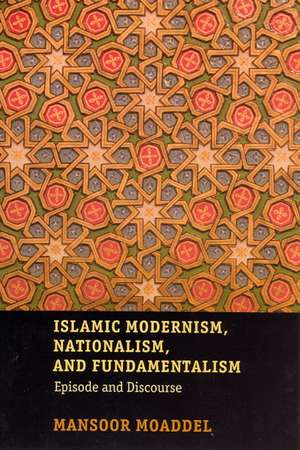Islamic Modernism, Nationalism, and Fundamentalism: Episode and Discourse
Autor Mansoor Moaddelen Limba Engleză Paperback – 11 iul 2005
The Islamic world has experienced extensive social changes in modern times—the rise of new social classes, the formation of massive bureaucratic and military states, and the incorporation of its economies into the world capitalist structure. Yet despite these changes, a national consensus on even the most important principles of social organization—the form of government, the status of women, national identity, and rule making—has yet to emerge.
An ambitious comparative historical analysis of ideological production in the Islamic world from the mid-1800s to the present, Mansoor Moaddel's Islamic Modernism, Nationalism, and Fundamentalism provides a unique perspective for understanding the social conditions of these discourses. Moaddel characterizes these movements in terms of a sequence of cultural episodes characterized by ideological debates and religious disputations, each ending with a revolution or military coup. Understanding how the leaders of these movements formulated their discourses is, for Moaddel, the key to understanding Middle Eastern history. This premise allows him to unlock for readers the historical process that started with Islamic modernism and ended with fundamentalism.
An ambitious comparative historical analysis of ideological production in the Islamic world from the mid-1800s to the present, Mansoor Moaddel's Islamic Modernism, Nationalism, and Fundamentalism provides a unique perspective for understanding the social conditions of these discourses. Moaddel characterizes these movements in terms of a sequence of cultural episodes characterized by ideological debates and religious disputations, each ending with a revolution or military coup. Understanding how the leaders of these movements formulated their discourses is, for Moaddel, the key to understanding Middle Eastern history. This premise allows him to unlock for readers the historical process that started with Islamic modernism and ended with fundamentalism.
Preț: 208.31 lei
Preț vechi: 232.73 lei
-10% Nou
Puncte Express: 312
Preț estimativ în valută:
39.86€ • 41.73$ • 32.98£
39.86€ • 41.73$ • 32.98£
Carte indisponibilă temporar
Doresc să fiu notificat când acest titlu va fi disponibil:
Se trimite...
Preluare comenzi: 021 569.72.76
Specificații
ISBN-13: 9780226533339
ISBN-10: 0226533336
Pagini: 424
Ilustrații: 1 line drawing, 8 tables
Dimensiuni: 152 x 229 x 28 mm
Greutate: 0.63 kg
Ediția:1
Editura: University of Chicago Press
Colecția University of Chicago Press
ISBN-10: 0226533336
Pagini: 424
Ilustrații: 1 line drawing, 8 tables
Dimensiuni: 152 x 229 x 28 mm
Greutate: 0.63 kg
Ediția:1
Editura: University of Chicago Press
Colecția University of Chicago Press
Notă biografică
Mansoor Moaddel is professor in the Department of Sociology, Anthropology, and Criminology at Eastern Michigan University. He is the author of three previous books including, most recently, Jordanian Exceptionalism.
Cuprins
Acknowledgments
Introduction: Sociological Theories of Ideology and Cultural Change
Part One: The Rise of Islamic Modernism
Introduction to Part One
1. Social Transformation and the Origins of Islamic Modernism
2. Historical Discontinuity and International Transfer of Meaning
3. Europocentric Rationalism and Islamic Modernism in India
4. The French Enlightenment and Islamic Modernism in Egypt
5. Iran: The Bastion of Traditionalism and Conservative Reaction
Part Two: The Rise of Liberal Nationalism, Arabism, and Arab Nationalism
Introduction to Part Two
6. Egypt: The Rise of Liberalism and Territorial Nationalism
7. Syria: From Liberal Arabism to Pan-Arab Nationalism
8. Iran: From Constitutionalism and Anticlerical Secularism to Economic Nationalism
Part Three: The Rise of Islamic Fundamentalism
Introduction to Part Three
9. The Rise of the Muslim Brothers in Egypt: From Moderate to Revolutionary Activism
10. Ba'athist Socialism and Militant Reformist Fundamentalism in Syria
11. Iran: The Monarchy-Centered Nationalist Discourse and the Origins of Clergy-Centered Revolutionary Shi'ism
12. Algeria: The Socialist Turn and Radical Islamism
13. Jordanian Exceptionalism: The Alliance between the State and the Muslim Brothers
Conclusion: Episode and Discourse: Ideology, Target, and Practice in the Islamic World
Notes
Bibliography
Index
Introduction: Sociological Theories of Ideology and Cultural Change
Part One: The Rise of Islamic Modernism
Introduction to Part One
1. Social Transformation and the Origins of Islamic Modernism
2. Historical Discontinuity and International Transfer of Meaning
3. Europocentric Rationalism and Islamic Modernism in India
4. The French Enlightenment and Islamic Modernism in Egypt
5. Iran: The Bastion of Traditionalism and Conservative Reaction
Part Two: The Rise of Liberal Nationalism, Arabism, and Arab Nationalism
Introduction to Part Two
6. Egypt: The Rise of Liberalism and Territorial Nationalism
7. Syria: From Liberal Arabism to Pan-Arab Nationalism
8. Iran: From Constitutionalism and Anticlerical Secularism to Economic Nationalism
Part Three: The Rise of Islamic Fundamentalism
Introduction to Part Three
9. The Rise of the Muslim Brothers in Egypt: From Moderate to Revolutionary Activism
10. Ba'athist Socialism and Militant Reformist Fundamentalism in Syria
11. Iran: The Monarchy-Centered Nationalist Discourse and the Origins of Clergy-Centered Revolutionary Shi'ism
12. Algeria: The Socialist Turn and Radical Islamism
13. Jordanian Exceptionalism: The Alliance between the State and the Muslim Brothers
Conclusion: Episode and Discourse: Ideology, Target, and Practice in the Islamic World
Notes
Bibliography
Index
